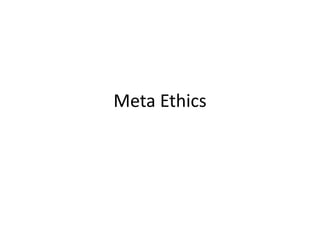
Meta Ethics Guide
- 1. Meta Ethics
- 2. Meta Ethics • Meta-ethics is a branch of analytic philosophy that explores the status, foundations, and scope of moral values, properties, and words( Encyclopedia of philosophy) • Where do ethical principles come from? Why be ethical? What is the meaning of ethical language? a) Metaphysical deals with the origin of ethics. Three schools that try to explain for us the origin of ethics. -Platonic Realists/platonic realism: Ethical Principles originate from the spirit world.
- 3. Meta Ethics Cont’d • Platonic realism is a philosophical term usually used to refer to the idea of realism regarding the existence of universals or abstract objects after the Greek philosopher Plato (c. 427–c. 347 BC), a student of Socrates. • He holds that knowledge is inborn, Natural, inherent, so that learning is the development of ideas buried deep in the soul. That each soul existed before birth with the form of good perfect knowledge of Ideas. Thus, when an Idea is "learned" it is actually just "recalled.
- 4. Meta Ethics Cont’d • Reality must conform to the content of the consciousness meaning that the presence of any notion ( belief/idea/opinion) in our minds proves a corresponding referent in reality. • Therefore Morality exists in spiritual form.
- 5. Meta ethics Cont’d • Moral Skeptics: There is no valued moral principle at all. • N.B Dunning (2015) says that skepticism is not a bout mere disbelief about things, but that it is the process of applying reason and critical thinking to determine validity. Skeptics re-direct attention towards something that perhaps has been a result of superstition. Scientific methods are central in skeptic reasoning. As a scientific method it then requires evidence, preferably derived from validated testing. Kropotkin (1922) goes ahead to then highlight Darwin’s conclusion about morality being a social instinct. Darwin studied social insects ( the ants, bees and wasps ) in which the activities of bees were compared to man’s/human societies. • Therefore; perhaps Ethical Principles come from society itself.
- 6. Great Ethical Traditions. • All traditions agree with the following as the necessary qualities of life, • Humility • Honesty • Kindness , • Wisdom • That relationships that are established with others should not only be enriching but also inspiring. • They provide guidance on how humans should relate( heterosexual relationships), before Marriage, in marriage. • Marriage, is among the four rites of passage • Work and leisure ( Judaism emphasis the Sabbath)not necessarily for economic value but every one has responsibility to do something to improve the world. The balance should be maintained • Wealth: some are against excessive accumulation of wealth: it corrupts, provokes evil, selfishness, argue for collective wealth for the good of the whole society . • Some argue that individuals have a right to accumulate wealth
- 7. Great ethical Traditions Cont’d • Teachings on other forms of life. • The concept of right and wrong • Each have their own teachings about how people should live with each other but commonly is the concept of order, truth and justice as ultimate cosmic ( outer) values and realities, Not just human ideas
- 8. Great ethical Traditions Cont’d • Teachings on other forms of life. • The concept of right and wrong • Each have their own teachings about how people should live with each other but commonly is the concept of order, truth and justice as ultimate cosmic ( outer) values and realities, Not just human ideas
- 9. Great ethical Traditions Cont’d • Hinduism aims at attaining total harmony of the cosmic order. Individuals are interlinked. They teach a bout duties than rights. Rights are secured by other peoples duties. Emphasis on equity rather than equality . Experience and action are key rather than belief. • Polytheistic in nature: There is general guidance but actual life decisions depend on human beings’ conscience. Hindus turn to their conscience first in seeking for solutions to a dilemma. They also look out for solutions in good people of society, leaders, etc. most decisions are made without reference to the holly books. For example, Hinduism has no commandment prohibiting killing. • They believe in reincarnation as a guide to behavior
- 10. Great Ethical Traditions Cont’d • Buddhism: the pre-occupation of the Buddhists is the sense of dissatisfaction(dukkha) Dissatisfaction creates a dangerous condition of human suffering, psychological conflict, pain, sickness, anxiety anguish and meaninglessness. This ethics call for inner reflection/concentration • Their teachings are mainly influenced by those of Buddha ( read the noble eight path) Central to their teaching is the sacredness in life and all that has life. i.e. all living things should never be harmed. NB Ethics is not religion and religion is not ethics. However ethics may draw inspiration from religion. Ethics uses rational reflection to pursue its goal. It has objective foundation even outside religion. For This reason even atheists have ethics
- 11. Great ethical Traditions Cont’d • N.B Unfortunately, Society is getting more secular, people mind more a bout success, wealth, being busy, and getting paid. The elderly, handicapped, sick feel, poor feel are made to feel useless and regarded social failures. People get abortion due to social reasons not due to health risks . • Advancement in science and technology is a another cause for moral decadence in society. • Death that should be seen as a natural occurrence is seen today as a medical failure and has become a source of conflict and mistrust in the medical system. However other factors can be considered as well.
